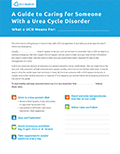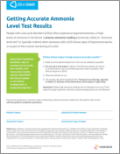Call a UCD Nurse Advocate who can discuss resources that may help you along your journey: 1-833-646-9823.
Call a UCD Nurse Advocate who can discuss resources that may help you along your journey: 1-833-646-9823.
Being diagnosed with a urea cycle disorder (UCD) is the first step on a lifelong journey, and it helps to know there are others who have been in the same situation. We understand and have put together resources to help you live a full life with a UCD. Making decisions about care is the next step in learning how to manage a UCD. Sometimes it can feel daunting, but seeing questions that other people with a UCD have asked and learning the answers can help you better manage your UCD.
I was first diagnosed with a UCD when I was 25. I went into liver failure when I was 20 weeks pregnant. A win for me was getting to the end of my pregnancy and having my son. That wasn’t a given that he was going to be here. A win for me today is if I can make it several months without getting sick. If I can make is 6 months with no ER visits, no emergency trips to the hospital. Just because I have a UCD does not mean I can’t be a mom. It doesn’t mean I can’t be a friend. Doesn’t mean I can’t go out. I just need to manage what I’m doing so that I’m able to do what I want to do. My name is Denise and I’m living with a UCD. Success with a UCD is possible.



Here are some frequently asked questions and answers to help you learn more about urea cycle disorders (UCDs) and to clear up some common misunderstandings.
A urea cycle disorder (UCD) is a rare genetic disorder that prevents the liver from working correctly. When we eat protein, our bodies break it down into smaller pieces called amino acids. We need some amino acids to grow and stay healthy. Amino acids are changed to ammonia in the body. Too much ammonia can be toxic, so it needs to be removed by the urea cycle.
In someone with a healthy urea cycle, enzymes in the liver turn ammonia into urea, and the body removes it through the urine. In someone with a UCD, an enzyme in the liver is missing or isn’t working and ammonia can’t be turned into urea and removed from the body. This causes ammonia to build up and reach toxic levels.
This can be very dangerous because ammonia can enter the bloodstream and travel to the brain. Ammonia in the brain can cause health problems like memory loss, behavior changes, and even coma or seizures.
Having a UCD has a big effect on people’s lives. They have to eat a low-protein diet and often take dietary supplements and medicine. A UCD can also trigger a medical emergency, so it’s very important to follow a UCD management plan and know when it is time to go to the hospital for treatment.
People with a UCD can have hyperammonemia, which means high levels of ammonia in the blood. Hyperammonemia can be harmful to the body. Someone with a UCD must keep very careful track of what they eat, drink, and do to help keep their ammonia levels within a safe range. You can use the Urea Cycle Disorder Tracker to help track your UCD management.
Hyperammonemia can also lead to something called a hyperammonemic crisis. This is when ammonia levels get so high that they become extremely toxic. This can lead to serious health issues like a coma or brain damage. A hyperammonemic crisis requires immediate medical attention.
Yes—there are 2 tests to measure ammonia in your body: an ammonia test and a glutamine test. These tests can only be done by a doctor in his or her office. Like ammonia, glutamine is a toxin that can build up in your body when you have a UCD.
Because ammonia levels go up and down throughout the day, an ammonia test will only measure the amount of ammonia in your body at the time of the test. But a glutamine test shows how much ammonia has built up in your body over a period of time, so it can give you and your doctor a fuller picture of how well your ammonia is controlled. It’s a good idea to talk to your doctor about your ammonia level and your glutamine level.
No—you can’t catch a UCD from someone else and you can’t outgrow a UCD. A UCD is a genetic disorder. This means it is something a person is born with and will have for life, unless he or she has a liver transplant.
In someone with a UCD, the body can’t process protein or remove ammonia correctly. Because of this, it’s important to eat a low-protein diet. Everyone’s low-protein diet is different. People are able to handle a different amount of protein based on many factors, including their age and the severity of their UCD. Since we all need some protein to grow and stay healthy, people with UCDs should work with their doctor and dietitian to find the exact number of grams of protein they should eat each day.
Our bodies need certain nutrients, like vitamins and amino acids, to grow, develop, and stay healthy. Some of these nutrients only come from protein. Since people with UCDs are on low-protein diets, they often take dietary supplements to make sure they are getting all the nutrients they need.
No—a UCD is something a person will have for life, unless he or she has a liver transplant. You can’t outgrow a UCD or cure it with diet or medicine.
No—a vegetarian diet and a low-protein diet are not the same thing. People often make the mistake of thinking these diets are the same since foods like meat and fish usually come to mind when we think about protein. But it’s important to know that some foods that are considered vegetarian can still have a lot of protein. For example, beans, dairy, spinach, broccoli, and peanut butter are all meat-free foods that are high in protein and could be dangerous to someone with a UCD.
Our bodies need protein to help us grow and stay healthy, so people with UCDs still need some protein in their diets. They just have to follow their special low-protein diet very carefully to make sure they don’t get too much.
UCDs affect everyone differently and at different times. Someone whose UCD is being well managed with diet and medicine may have long periods of time without a hyperammonemic crisis. Additionally, UCDs aren’t something you can see, like a broken leg or an allergic reaction. A UCD is always there, but it can be easy to forget about it when someone looks healthy and hasn’t been sick in a while.
Listen to two women talk about what it’s like to live with a disease that people can’t see.
It’s important to know that UCD symptoms can happen any time and that people with UCDs are always at risk for a medical emergency if something triggers a rise in their ammonia levels.
Most people think a urea cycle disorder, or UCD, is a condition that only affects the liver. But the most serious damage caused by a UCD actually happens in the brain. Symptoms like forgetfulness, a short attention span, moodiness, and even falling behind in reading abilities can all result from a UCD.
Ammonia in your blood can travel to your brain and harm your brain cells. High levels of ammonia can cause your brain cells to swell and malfunction, which can damage them to the point that they no longer work at all. One instance of elevated ammonia may not cause a permanent problem. But the more often your ammonia levels are elevated over time, the more likely it is that damage to your brain will be serious and permanent.
Damage to brain cells can make it difficult for you to make decisions and can cause you to function at a lower level than a typical person your age.
Make the connection of urea cycle (UCD) symptoms and the potential long term effects on the body.
Most people think a urea cycle disorder, or UCD, is a condition that only affects the liver. But it might surprise you to learn that the most serious damage caused by a UCD actually happens in the brain. Symptoms like forgetfulness, a short attention span, moodiness, and trouble with problem solving, all result from a UCD. It all starts with ammonia. Ammonia can travel through your blood to your brain, and it is harmful to your brain cells. High levels of ammonia may cause your brain cells to swell and malfunction which may damage them to the point that they no longer work at all. It’s important to remember that even though you can’t see this happening, higher than normal ammonia levels are dangerous to your brain. One instance of elevated ammonia may not cause a permanent or obvious problem. But the more often your ammonia levels are elevated over time, the more likely it is that the damage to your brain will be serious and permanent. Even if you’re not having a hyperammonemic crisis, high ammonia levels that are high enough to cause symptoms can still lead to permanent damage. So what can happen when brain cells are damaged? You may not notice the effects right away or even realize that they’re related to your UCD, but the problems that result from the damaged brain cells can affect your everyday life at home, at work, or at school. You may have issues like remembering things, difficulty making decisions, mood swings, and problems with thinking. Damaged brain cells may also cause you to function at a lower level than a typical person your age. Keeping ammonia levels low can help prevent damage to your brain over time. The best way to do this is by sticking to the management plan recommended by your doctor, which may include a low-protein diet, dietary supplements, and an ammonia-removing medicine (also called a nitrogen-scavenger medicine). Not following your low-protein diet or not taking your dietary supplements and medicine, even when you’re feeling healthy, can cause ammonia levels to rise. It’s very important to stick to the management plan your doctor has created for you and to take all the supplements and medicines as prescribed. So, remember, the major effects of high ammonia are actually on your brain which can cause serious symptoms. Tell your doctor about any and all symptoms you experience, even if you don’t think they are related to your UCD. And make sure to talk to him or her about your management plan and whether you should make any changes to help keep your ammonia levels under control.